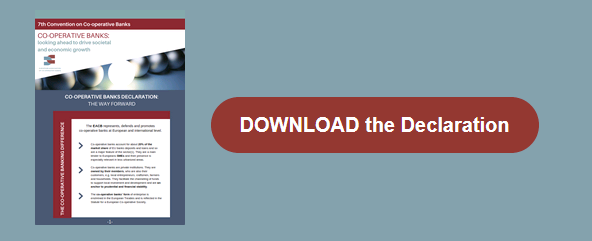
One month after the 7th Convention:
Interview with Mr. Gerhard Hofmann, EACB President
Dear President Hofmann, the EACB Convention has taken place on 28 March in Brussels at the Representation of the State of Hessen, with more than 150 participants and high level speakers from EU Institutions, regulatory authorities, academia and co-operative banks.
What have been, in your view, the key messages that emerged in the morning session ? And in particular in panel 1: on the changing regulatory and supervisory context and the capacity of cooperative banks to continue playing their key role in our economy and society ?
I have been impressed by the high level of participation and the quality and dynamism of exchanges at the 7th Convention. This is a landmark event for co-operative banks to discuss the key topics for our sector in an open dialogue with members, authorities, European Institutions academics and stakeholders.
This year, the aim was looking at the way forward, how co-operative banks can continue driving societal and economic growth in a context of rapid transformations be it in the markets, in the political settings or in the regulatory environment. There have been very inspiring exchanges on all those themes as well as new insights.
I am also very grateful for the collaboration with the State of Hessen which signals the regional dimension of co-operative banks deeply rooted in the EU territories and key actors to support – and where necessary - relaunch the local economies.
Moreover, I highly appreciated the support of Ms. Goualrd, MEP. I was particularly interested in her suggestions, in the key note opening speech, that co-operative banks may provide some answers to help re-build the trust of citizens in banks. Everybody welcomed her remarks, specifically when she underlined how important our co-operative banks’ governance model is as it places human beings at the heart of all activities.
To come to the key messages of the first panel, we have debated what are the policy recommendations for integrating the co-operative banks specificities in European and international rule.
While I am seeing that policy makers and regulators are acknowledging the importance to preserve bio-diversity in banking and that they see proportionality as a tool to achieve it, my questions is: will this be enough to really make a difference in co-operative banks’ practices ? How can we really avoid too much of a on-size-fits-all approach? What can be done to make the regulatory framework more cost effective and better aligned with the business activities and risk models? Those questions are on the table, but we need to work together with policy makers, regulators and supervisors for the best answers.
What do you see as the most important challenges – and opportunities – for cooperative banks in the era of digital transformation? What would you pick up on from the ‘case studies’ we heard in the second panel?
Co-operative banks embrace technological innovation and support the Digital Single Market. They are re-designing their proximity models making use of the opportunities offered by digitalisation while putting members and customers and their economic and social empowerment first.
The case studies presented in panel 2 have shown how advanced and innovative our banks can be by building on members inputs and centering their action around members’ digital needs, in line with our main goal that is promoting members’ value. Indeed, digitalisation will not be driven by very advanced technological approaches of banks and Fintecs, but by demand of our clients. Banks need to be ready to meet the needs of their clients and – given the uncertainty around the digital agenda – remain open to changes in their technological responses. Co-operatives have a solid track record of adapting to changing circumstances. Insofar, I am remaining optimistic that digitalisation will not just mean substantial investments in Information Technology and the cultural change in banks, but that it will result in new opportunities and higher efficiency.
However it clearly emerged that in order to support the digital transformation the regulatory environment plays an important role, and that – in particular for customer data - a level playing field with other digital financial services providers is necessary.
What struck you most about our discussion on the multiple crises facing the EU? What conclusions do you draw from that and what implications does this have for cooperative banks?
The exchanges in the final panel have been both very interesting and highly relevant, raising several questions on the post-Brexit environment and if the European Union is at a turning point. It was also interesting to hear the authoritative views of MEPs and researchers on the Heads of States Rome’s Declaration (60th Anniversary of the Rome Treaties), on the EU Commission White Paper and on the European Parliaments Report.
All in all it was an inspiring debate on how the European Union can become more adult, stay resilient and can continue ensuring peace and prosperity for their citizens. The European Union is indeed a unique example of an alliance of sovereign governments. At the same time it has to meet the needs of its citizens better, ensure credible policy approaches and overall be successful in fulfilling its mandate. The Rome Declaration shows the importance of both preserving the European Union and to reform it. Within the banking union, co-operative banks continue to reiterate that improvements in the area of proportionality are essential to give room to the diversity of the co-operative banking features and indeed the diversity of the banking sector. Policy makers and regulators should consider the value of diversity for societies. Diversity in the financial sector allows for more freedom of choice for consumers, increases competition and acts as an inbuilt stabilizer which adds to financial stability. The role of co-operative banks in their specific field of competence is to help improve the living conditions of its citizens, thus bringing the European project closer to the people via their local mission of financing the real economy and the proximity they have with their customers.




